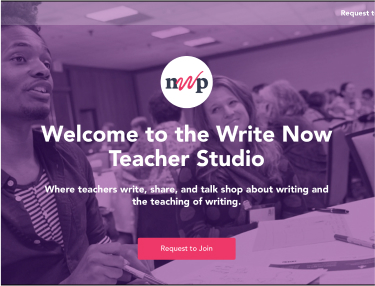Discover Content
Results for “Family Literacy”
Design Opportunities to Collaborate with Families
How can we make schools feel more welcoming to families, especially families who might not traditionally have felt welcomed there? Resources in this set are for teachers and writing project leaders who want to encourage family-school collaborations.
The Write Time with Educators Rose Brock, Jill Stedronsky, and Author James Ponti
The Write Time visits with James Ponti, the New York Times bestselling author of three middle-grade book series, and educators Rose Brock and Jill Stedronsky.
Learning Alongside: Embracing Digital Storytelling with Social Justice in Mind
Three educators from the Colorado State University Writing Project discuss their Saving Our Stories (SOS) project, a partnership between students, preservice teachers, and community members formed to collect oral histories about Fort Collins with a focus on digital storytelling, teaching to…
Family Matters: A Mother and Daughter’s Literacy Journey
What happens when we explore our "people"—when, through writing, we explore the richness of our culture, our family, our identity? How often do we find examples of a mother and daughter who have the opportunity to experience a summer institute together? This beautifully written narrative set…
Narrative Writing Works Magic with Children Learning English
Lisa Ummel-Ingram tells the story of engaging her third graders in creating books that honored their lives, language and cultures through storyboarding, sharing, conferencing, gathering information, and illustrating. Student ownership, confidence and language development extended into…
Writing in Home Dialects: Choosing a Written Discourse in a Teacher Education Class
In exploring how to encourage her Caribbean teacher education students to use their vernacular dialects (vernacular Englishes, Spanish, and Haitian Creole) in narrative writing, Kennedy discovered reluctant writers who lacked confidence, in part because their use of home languages had always…
30 Ideas for Teaching Writing
30 Ideas for Teaching Writing offers successful strategies contributed by experienced Writing Project teachers. Although originally published to celebrate the National Writing Project's 30th anniversary in 2004, readers can still benefit from this variety of eclectic, classroom-tested…
Writing Our Future Through Family Literacy Projects (NWP Radio)
In this NWP Radio Show, writing project leaders discuss their family academic literacy projects, developed as part of the Writing Our Future Initiative. Based in high-needs schools around the country, this work provides support and interactive programming for English Language Learners grades…
Cultural Citizenship and Latino English Language Learners
This short article emphasizes the importance of creating “a safe space for language and literacy development.” The authors argue for students’ rights to use their own “linguistic and cultural resources for learning.” Teachers who are eager for a conversation about about advocacy and Latino…
The Family Writing Project Builds a Learning Community in Connecticut
Family writing projects are an powerful resource for families for whom English is not a first language and who are sometimes unfamiliar with the dominant school culture. The projects provide opportunities to build relationships among families, students and teachers while strengthening…
Voces del Corazón: Voices from the Heart
Family Literacy Nights were created by teacher-consultants from the Sabal Palms Writing Project who partnered with two middle schools to reach out to parents and families in low-income communities. The article tells their story through examples and parents' and students' words (Spanish and…
Write Now Teacher Studio

Where teachers write, share, and talk shop about writing and the teaching of writing
Hosted by the National Writing Project, the Write Now Teacher Studio is an open, online community of educators for educators. It’s a place to write together, examine our teaching, create and refine curricula, and work toward ever more effective and equitable practices to create confident, creative, and critical thinkers and writers in our classrooms and courses.

